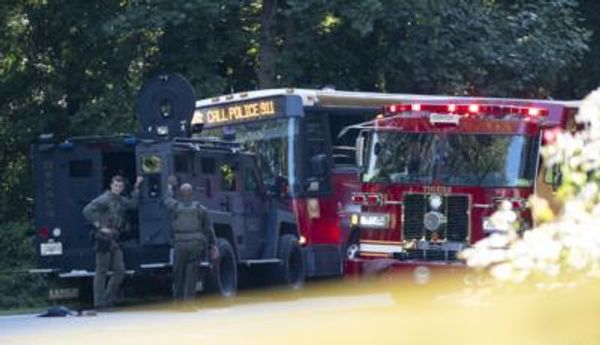
Abe Dane would be the first to admit he had concerns about election fraud during the 2020 election. He believed the elections in his own county, where he had worked the polls, were clean – but he wasn’t sure about other counties in the state, where unfounded claims of fraud swirled in 2020.
That was before he took a position in local election administration. Now, with first-hand experience, Dane, the director of elections in Hillsdale county, Michigan, is confident in the process.
It’s convincing others that’s the challenge now.
Since 2020, deep-red Hillsdale county has been a flashpoint for election anxieties. Stephanie Scott, the elections clerk from Adams Township – one of the offices in Dane’s jurisdiction – earned the attention of figures in Donald Trump’s inner circle as she spread false claims of fraud and refused orders by the secretary of state’s office to turn over voting equipment for regular maintenance. Scott was ousted in a recall campaign by activists who were fed up with her insistence on spreading the false claim that the last election was stolen from Trump.
On 8 May, the Michigan attorney general, Dana Nessel, announced felony charges against Scott and her attorney, Stefanie Lambert, for allegedly turning over private voter data from the 2020 election to an unauthorized third party.
Meanwhile, Scott has filed paperwork to challenge Dane in his fall election for Hillsdale county clerk.
The Guardian spoke with Abe Dane about running an elections office during troubled political times – and his own shifting view of election security.
In a more conservative area, like Hillsdale, where people know that their neighbors are mostly going to be voting along a certain party line, do you still see the same kind of politicization around election administration as elsewhere? What does that look like for you, in a conservative town, as an elected Republican?
Being a Republican and administering elections, I’m pushing back on that [politicization]. I try my best when I’m at township meetings, or city meetings, to choose my words carefully.
I guess when I first started, I was a little bit more cautious. Here’s an example: I would say, “In Hillsdale county, there is no election fraud going on. We are doing things right in this county.” I’d always say “in this county”. I’ve gotten to the point now where I personally believe that our elections nationwide are completely fine. And so I’m starting to stop that, and to stop trying not to offend my fellow Republicans in my county. I’ll just say flat out, like, “I don’t think there was election fraud anywhere. I think people have a different worldview than you and you can’t accept that.”
You mentioned earlier you had doubts about the election and concerns about election fraud, but it sounds like your view now has shifted. Can you tell me about that evolution?
Well, to start with, in 2020 and before, I wasn’t in county government at all.
I began to be an election inspector in the 2020 elections, and I knew things were on the up-and-up here. I didn’t have any questions about our own county. But I had questions about, you know, Detroit or Wayne county – things like that. As I got into election administration, I started seeing the processes, the checks and balances, the security that’s involved, and got familiar with a qualified voter file – the state’s voter registration system – and how they manage that list.
There’s no good training to be an election administrator that’s from an accredited school. So, our education comes from our peers, and our associations – I’m rubbing shoulders with the elections director in Wayne county and [officials] all over the state, and we’re developing these relationships, and I’m saying, “You know, these are people just like me.” They care about their voters, they care about everyone having access to the polls. They care about making sure everything balances, and every vote is counted. And there’s no partisanship in that.
Clerks should be non-partisan, because all we care about is allowing people to have access to the voting process.
So no, there’s no fraud here.
Given that you are part of this community, do you think that your evolution on this has given some credibility to election processes, with you having seen it from the inside and being able to communicate about it?
I wish I had that much influence. It’s really just the people that are in my circle, that know me on a personal level, that I would have that kind of an impact on. So unfortunately, it’s not like that.
No, it’s a battle that all of us election administrators have to fight – to help people understand what we’re trying to do and the process that’s in place to keep it accurate and honest. It’s going to take time and this election coming up – depending on how it goes – it might set us back another number of years in trying to get people to the point where they can trust our elections.
Among our clerks and election inspectors, there are a good percentage of them that actually have concerns about people causing trouble in the precinct on these big elections. We’re working with our local law enforcement to try and visit the precincts, and even this one I had yesterday, I talked to the sheriff and I said: “It would go a long way if you just popped in there. It’s just one little precinct open, but they would love to see you there sometime.” And he did.
Now that we’re getting a little bit closer to the election, what types of security threats are you preparing for? Or does it not feel that tense here?
I would like to say it doesn’t feel that tense here, but we need to be prepared for anything.
So we’re getting ready to do our inspector training – every election inspector in our county that will be working all the precincts in August and November will need to take their two-year recertification, and I’ll be doing that. So it’s a big ordeal. It takes two months to go through and I think there’s close to 300 people that we have to train.
And in that, [security] is going to be one of the things that we talk about – and that’s the preparation. It’s: OK, what if this happens, what do you do? Who do you call?
If I have the time, which is difficult with my time restraints right now, I’m trying to develop a document that will help facilitate communication if something does happen – whether it’s security, or whether it’s a weather issue, to facilitate communication between myself and the clerk’s office and the sheriff’s department or central dispatch, 911 operation and any county maintenance and stuff to be able to get things orchestrated, if we have to change a precinct location or if we have to deal with emergency in a precinct.
As the 2024 general election approaches, at the national and also local level, people who rejected the results of the 2020 election are getting more active. What’s been the most effective way that you’ve been able to push back against election denialism?
I would say the most effective way is to have the time to be able to go out in the community and talk at public events or clubs and organizations and even the township and city meetings, and just give presentations to give that information about how our processes work.
I’ve seen in other communities where they have more staff, and more time, where they can invite people in and have trainings just for the community on elections – not necessarily to make them inspectors, but to just teach them about the processes and inviting them in to conduct audits of an election precinct voluntarily.
On a different subject, I am curious – is Stephanie Scott campaigning against you? Is that election a concern?
To be honest, I’m not losing sleep over it. I put a lot of time and effort, blood, sweat and tears into this place. So I want to win. But if I lose, then I have a market where I can easily find another job that pays better and is less stressful and less hours. So it’s a win-win either way for me.
So you’d stay in election administration?
I do love election administration. And I love this community. And I want my family to grow up here. So yeah, I want to stick it out.







